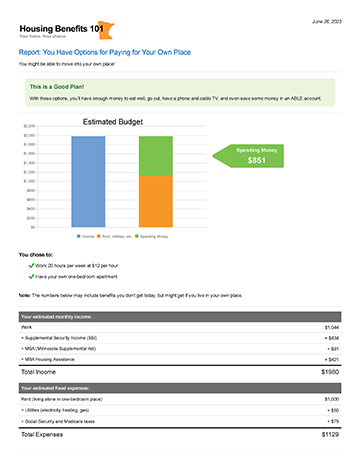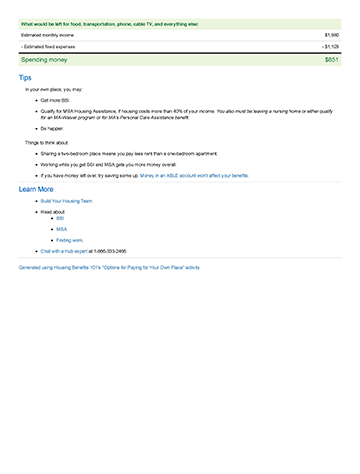Housing costs are the biggest expense most people have. As you think about housing, you need to figure out what you can afford; find ways to cut your housing expenses; see if there are programs that can help you; and compare your options.
If you have no housing right now, see HB101's Homeless Services Map.
See What You Can Afford
My Vault
:
Activity
Options for Paying for Your Own Place


Do this Vault activity to Compare budget options for getting your own place.
View example
.Go To Activity
Housing expenses include rent, electricity, gas, heating oil, insurance, and anything else related to the place where you live. What you can afford depends on things like your income, the size of your family, your other expenses, like education or medical expenses, and whether you are in debt. Your goal is to have more income than expenses each month. And the less you spend on housing, the better your total financial situation will be for the long-term.
At the same time, it's important to live in a place that is decent: it should meet all safety and health standards, so that you and your family can have quality lives.
Cut Housing Expenses
Here are some ideas that might help if you are spending too much on your housing:
- Share a place with others. If you live with other people, you can have your own bedroom, but save money on rent, since you’ll be sharing the kitchen, living room, and bathroom. There are also formal shared living settings, like Adult Foster Care (AFC), where the housing includes services.
- Do work around the house in exchange for lower rent, such as gardening or repairs. If you live with others, you can try to make a deal with your roommates where you do some extra chores in exchange for a lower share of the rent.
- If you rent, claim the Renter’s Property Tax Refund for Minnesotans who rent and have annual household income below $77,570. You could get up to $2,720 back on your state taxes.
- If you own your home, see what programs might help you. Some programs may help you make your mortgage payments. Other programs for homeowners include tax credits, savings programs, and loan programs.
- Look into energy and weatherproofing programs. Minnesota has a program that helps you with utility bills, like electricity and gas. If you own your home, there’s a program that may help you make your home more energy-efficient.
These are just some examples of how you can save money and live better.
Affordable Housing Programs
If you need more help, see what types of housing programs might help you:
-
Voucher programs help people pay for rent in any privately owned apartment that meets certain standards and where the landlord accepts payment from the voucher program. If a voucher program helps you, you usually pay about 30% of your income as rent and the program will pay the rest.
- Examples: The Section 8 housing choice voucher (HCV) program, Bridges, Housing Trust Fund (HTF) Rental Assistance, and the Family Unification Program (FUP).
-
Project-based programs help people live in specific privately owned apartments that are set aside only for people with low income. You do not get to choose your apartment. With many project-based programs, you pay about 30% of your income as rent and the program will pay the rest.
- Examples: The Section 8 project-based voucher (PBV) program, some units available from HUD Homeless Programs, and HTF Rental Assistance.
-
Public housing helps people live in specific publicly owned apartments. You do not get to choose your apartment. At first, you pay about 30% of your income as rent, but this can change if your income goes up.
- Note: Most public housing is operated by government agencies called public housing authorities (PHAs). Not all areas have public housing.
-
Cash benefits give financial help to people who cannot afford to pay for their housing.
- Examples: MSA Housing Assistance gives some people with disabilities $483.50 per month. Housing Support (formerly Group Residential Housing) helps pay for housing and services for people with disabilities who are living in places like Adult Foster Care (AFC), Board and Lodge, supervised living facilities, and Boarding Care Homes.
These charts list many of the programs that can help pay for housing:
Compare Your Options
The articles in this section compare the different programs that can help you pay for housing by looking at:
- Which programs make sense for which people. For example, some programs are for people with disabilities, while others are for families with children.
- What settings different programs will pay for. For example, the Section 8 housing choice voucher helps people in privately owned apartments, while public housing has specific government-owned buildings.
- What types of housing expenses programs will pay for. For example, some programs help with rent, while others help with services.
- How long a program will help. For example,the Crisis Housing Assistance Program usually helps pay for housing for 90 days or less, while other programs may help for years.
- How to apply. Programs are operated by different agencies, including public housing authorities (PHAs), nonprofits, or local governments, and they may require you to fill out different application forms.
- Who can help you. It's important to find people who can support you in figuring out how to pay for your housing.





Give Feedback